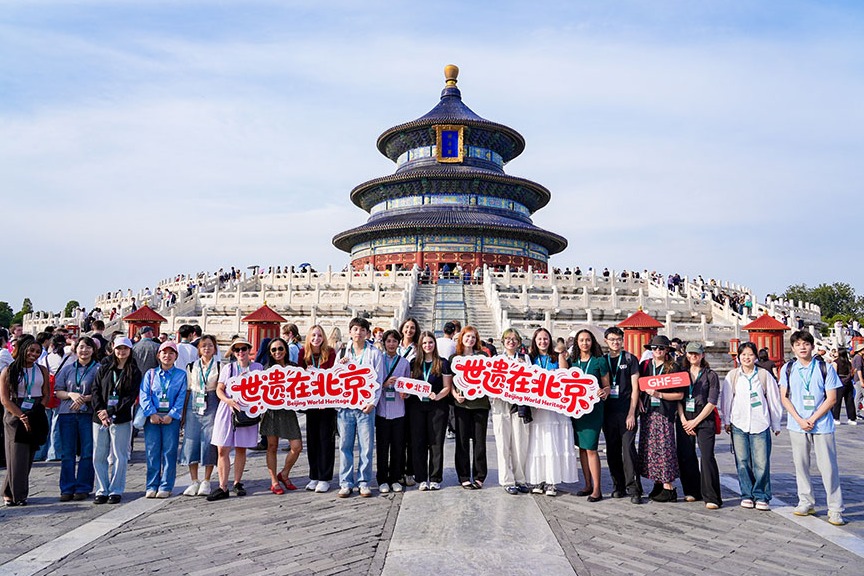Think small, save big, enjoy more
In a new phenomenon, many tourists are taking bullet trains to smaller cities in China to catch much cheaper flights for their vacations abroad






Yang Xiuli can't stop talking about this wonderful deal she got while traveling to Thailand recently. Earlier this month, the 26-year-old traveled from Beijing to Datong in Shanxi province by train and from there flew to Bangkok, Thailand. The round-trip flight for two from Datong to Bangkok cost only 890 yuan ($125.27).
"On a high-speed train, the journey from Beijing to Datong (340 kilometers) takes less than two hours, the same time it takes to get from Xizhimen to Daxing airport (a little over 50 km) in Beijing by taxi, but the airfare from Datong to Bangkok is less than half the airfare from Beijing to Bangkok. Missing out on such a deal would have been foolish," Yang said.
"Even though these tickets cost less, the airline didn't compromise on punctuality, basic services, or flight safety. We had a comfortable flying experience both to and fro. In fact, the cheap tickets were a smart choice — the money we saved allowed us to spend more on food and other experiences in Thailand, offering us greater value for money," she said.
And theirs wasn't an isolated case.
Cheaper gateway
While standard airfare between major cities can be high, young travelers like Yang are changing the tourism economics by employing creative strategies, such as by combining bullet train travel with newly launched regional airport routes that cost 70 percent cheaper than when flying from major cities.
Thousands of young people from big cities like Beijing and Shanghai are taking high-speed trains to second- and third-tier cities like Datong and Yuncheng in Shanxi province and Linyi in Shandong province to catch newly launched direct international flights. Using such routes they are able to fly to destinations like Bangkok, Moscow, and Seoul for half the usual price or even less.
The Datong Yungang International Airport actually exceeded Yang's expectations. "From entering the airport to reaching the boarding gate, it took us just 10 minutes. It takes longer to walk from security check to the boarding gate at Beijing's Daxing airport," she said.
The efficiency of this small airport is its biggest advantage. There are no long lines or complex pathways, allowing travelers to come and go almost as they please. The service at the airport is equally good. "The staff at the airport proactively offer guidance and are very patient," Yang said.
This efficient and convenient experience is also why more young people are choosing to fly overseas from smaller city airports. Compared to long lines and waits at major international airports in Beijing, Shanghai, Guangzhou, and Shenzhen, these smaller airports provide a relaxed and enjoyable travel experience.
Ticketing apps indicate that round-trip flights from Beijing to Bangkok cost around 2,300 to 2,400 yuan. However, departing from Datong, including the high-speed train ticket from Beijing to Datong, brings the total round-trip cost per person to only 600-700 yuan.
Smart deals
For young travelers, it isn't just about finding a good bargain; it's also about making smart consumption choices.
"When young people can travel abroad at a lower cost, why not?" said Sun Jiashan, a researcher at the Central Academy of Culture and Tourism Management. He believes this trend cannot simply be defined as "budget travel" or consumption downgrade.
"When the new generation views overseas travel as a regular consumption choice, they focus more on the value of their travel experience. This actually represents an upgrade in cultural consumption — they have higher demands for the quality and intrinsic value of travel," Sun said.
This phenomenon has parallels in the "grand tour "culture that has existed in Western countries for a long time, he said.
Sun mentioned that during a recent conference in Thailand, he observed many "digital nomads", or remote workers, from Western countries choosing to live long-term in Thailand, where the cost of living is relatively low, instead of indulging in luxury consumption.
Moreover, the availability of low-cost tickets is a result of a combination of government subsidies and market mechanisms.
Many of Datong's international routes are contracted by Shanxi Baohua Travel Agency, with most flights chartered for group tours. When there aren't enough group travelers, the agency sells the remaining seats online at low prices, often accompanied by government subsidies, according to local media reports.
Zhao Sikai, a route manager at Shenzhen Airlines' Changsha office in Hunan province, confirmed this model: "Part of the reason is that local governments provide route subsidies to stimulate local tourism and the economy, effectively reducing the airlines' operational risks and allowing them to offer ultra-low-cost tickets."
This model is spreading across the country. Tickets on routes like Yuncheng to Japan's Nagoya, Linyi to Osaka, and Jinan in Shandong to Seoul cost significantly lower than that for direct flights from first-tier cities.
At the end of August, Nanchang in Jiangxi province resumed direct flights to Kuala Lumpur, Malaysia, with one-way tickets costing only a few hundred yuan, and each flight saw over 90 percent occupancy.
Before the National Day holiday, international flights from Changsha and Zhangjiajie in Hunan province to popular overseas destinations like Seoul and Bangkok were priced only between 600 and 800 yuan.





























